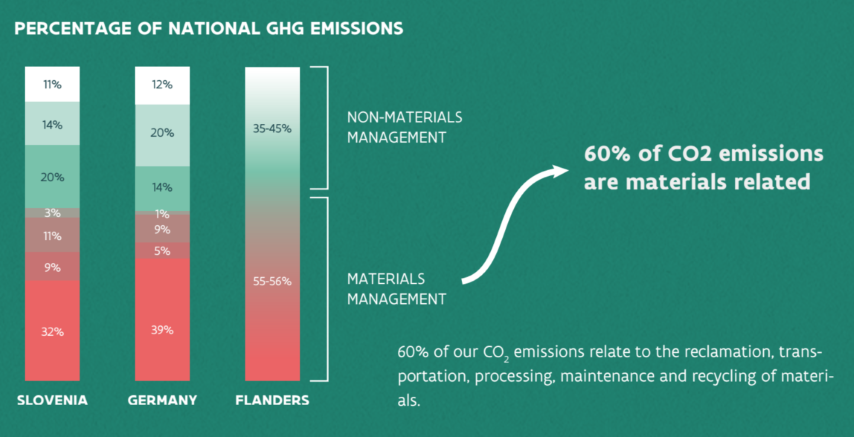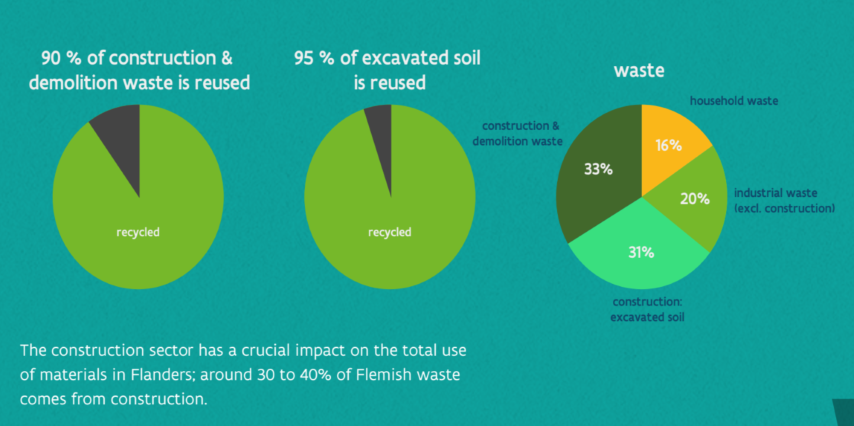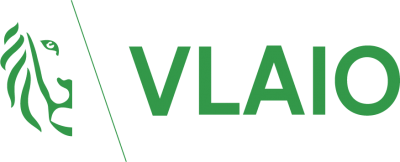Topics
We organise our actions in six thematic & strategic agendas:
Strategic Agendas:
Bio-economy
Circular Construction
Chemicals/Plastics
Manufacturing Industry
Food Chain
Water Cycles
Seven leverages provide additional support:
Leverage effects:
Lever Policy Instruments
Lever Circular Procurement
Lever Communication
Lever Innovation & Entrepreneurship
Lever Financing
Lever Jobs & Skills
Lever Research
What, why and how?
Why are we pursuing a circular economy?
Future visions 2050
How do we see our circular future?
About our management
Who steers what at Flanders Circular?
The Flemish Minister of Nature, Agriculture and the Environment, Koen Van den Heuvel joined Circular Flanders in launching the VCB’s (Flemish Building Confederation) and OVAM's Green Deal on Circular Construction. In the spring of 2019, more than 300 organisations registered in two waves. That makes this Green Deal the most successful ever.
Why are we doing this?
About 30 to 40% of our waste derives from the construction industry. How we build and live also has a major impact on our carbon footprint, which is why a joint transition to circular construction would make a tremendous difference. Moreover, the construction sector network in Flanders has firm local roots. That makes it significantly easier to close loops in the chain. What that means, in the end, is that the Green Deal on Circular Construction is a choice for maximum impact in Flanders.
What does the Green Deal on Circular Construction (GDCC) entail?
The Green Deal emphasises that a combination of practice and learning is the core of this policy. The participants start experiments and bring their accumulated knowledge and experience together in a learning network. We test tools, methodologies and new forms of chain cooperation.

In addition, a research group is making a concerted effort to develop the so-called preconditions to a circular economy, i.e. the legal, economic and other barriers to be faced and tackled along the way. Data and experiences from the experiments feed into this research and together we formulate solutions.
About four times a year, we gather the participants of the Green Deal to provide inspiration via presentations on Flemish and foreign cases. We also really get down to work on concrete issues that the participants table, such as tools and measuring instruments over the course of this event. The point is to work as a team to find out what the transition to a circular economy implies for the construction sector.
Circular Contruction, The Facts
In a circular construction economy, products and materials are reused as often as possible and residual waste is minimised.
.jpg)
Our definition
Circular construction is a building practice focussed on achieving efficient and effective use of resources to create – or at least maintain – economic, social and ecological (added) value, taking into account the current legacy and future opportunities specific to the Flemish building world. How we achieve this is via a comprehensive and dedicated collaboration within the value network.
Three main objectives
Specifically, there are three objectives of focus:
- systemic change in terms of design, construction and/or dismantling practice;
- adapting the business model to create social value in addition to financial profit;
- develop, share, apply and adjust knowledge, data and practical experience through partnership



















